
Euthalia aconthea, the common baron, often called simply baron, is a medium-sized nymphalid butterfly native to Sri Lanka, India and southeast Asia. It flies with stiff wing beats and often glides. The wing is not flapped very far below the horizontal.

Cepora nerissa, the common gull, is a small to medium-sized butterfly of the family Pieridae, that is, the yellows and whites, which is native to Sri Lanka, India, China, southeast Asia, and Indonesia.
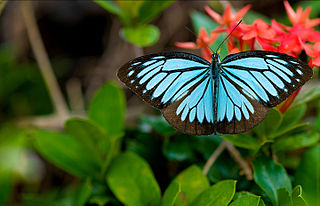
Pareronia valeria, the common wanderer or Malayan wanderer, is a medium-sized butterfly of the family Pieridae, that is, the yellows and whites, and is found in India and Southeast Asia. The butterfly found in India is sometimes considered as a separate species, Pareronia hippia.

Papilio nephelus is a species of swallowtail butterfly belonging to the family Papilionidae. Subspecies include P. n. chaon, the yellow Helen, and P. n. sunatus, the black and white Helen.

Papilio clytia, the common mime, is a swallowtail butterfly found in south and southeast Asia. The butterfly belongs to the subgenus Chilasa, the black-bodied swallowtails. It serves as an excellent example of a Batesian mimic among the Indian butterflies.

Athyma selenophora, the staff sergeant, is a species of nymphalid butterfly found in tropical and subtropical Asia.
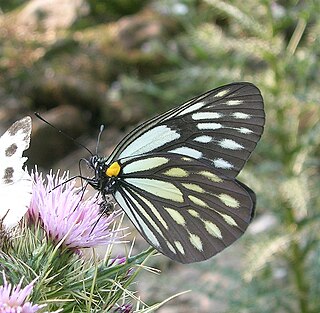
Aporia agathon, the great blackvein, is a mid-sized butterfly of the family Pieridae, that is, the yellows and whites, which is found in Nepal, India, China and Southeast Asia.
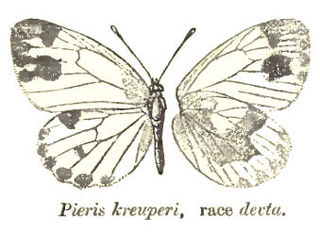
Pieris krueperi devta, the green-banded white, is a small butterfly of the family Pieridae, that is, the yellows and whites. It is found in India and Pakistan. It is a subspecies of Krueper's small white.

Ixias pyrene, the yellow orange tip, is a small butterfly of the family Pieridae, that is, the yellows and whites, which is found in Sri Lanka, India and southeast Asia.

Cepora nadina, the lesser gull, is a small to medium-sized butterfly of the family Pieridae, that is, the yellows and whites. The species was first described by Hippolyte Lucas in 1852. It is native to Sri Lanka, India, Myanmar, Hainan, and southeast Asia.
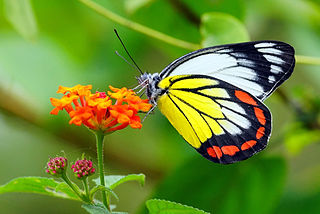
Delias hyparete, the painted Jezebel, is a medium-sized butterfly of the family Pieridae, found in South Asia and Southeast Asia.
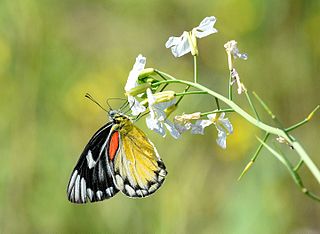
Delias descombesi, the redspot Jezebel is a medium-sized butterfly of the family Pieridae, that is, the yellows and whites.

Delias pasithoe, the redbase Jezebel is a medium-sized butterfly of the family Pieridae, that is, the yellows and whites. The species is found in parts of South Asia and Southeast Asia. There has been some dispute for which species the specific name aglaja, used twice by Linnaeus in 1758, applies – the redbase Jezebel, or the dark green fritillary, a brush-footed butterfly. Here, Delias pasithoe is used for the redbase Jezebel, based on the replacement name proposed by Linnaeus himself.
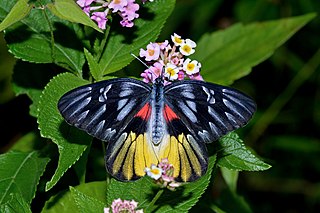
Delias acalis, the redbreast Jezebel, is a medium-sized butterfly of the family Pieridae, that is, the yellows and whites.
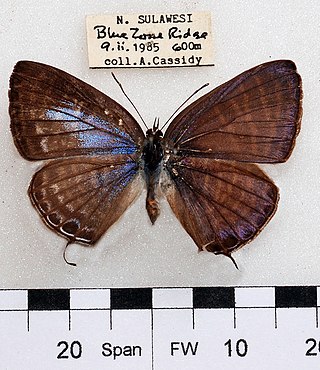
Nacaduba pactolus, the large four-line blue, is a species of lycaenid butterfly found in Indomalayan realm.
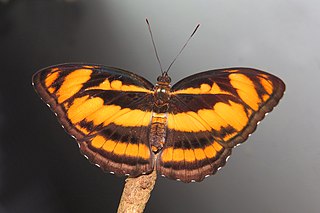
Athyma nefte, the colour sergeant, is a species of brush-footed butterfly found in tropical South and Southeast Asia.

Vindula erota, the common cruiser, is a species of nymphalid butterfly found in forested areas of tropical South Asia and Southeast Asia.
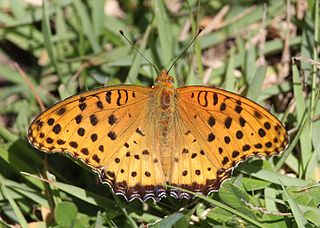
The Indian fritillary is a species of butterfly of the nymphalid or brush-footed family. It is usually found from south and southeast Asia to Australia.

Pareronia hippia, the common wanderer or Indian wanderer, is a medium-sized butterfly of the family Pieridae, that is, the yellows and whites. It is found in India. Some authors consider this as a subspecies of Pareronia valeria.
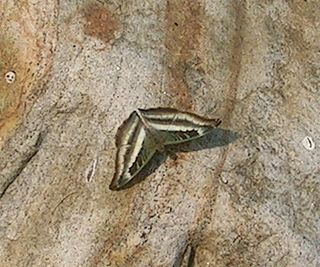
Auzakia is a monotypic butterfly genus in the family Nymphalidae. It contains the single species, Auzakia danava, the commodore, which is found from Tibet to Sumatra.






















